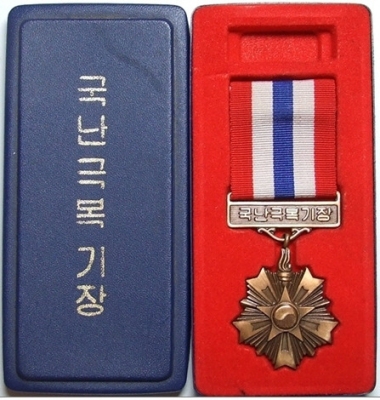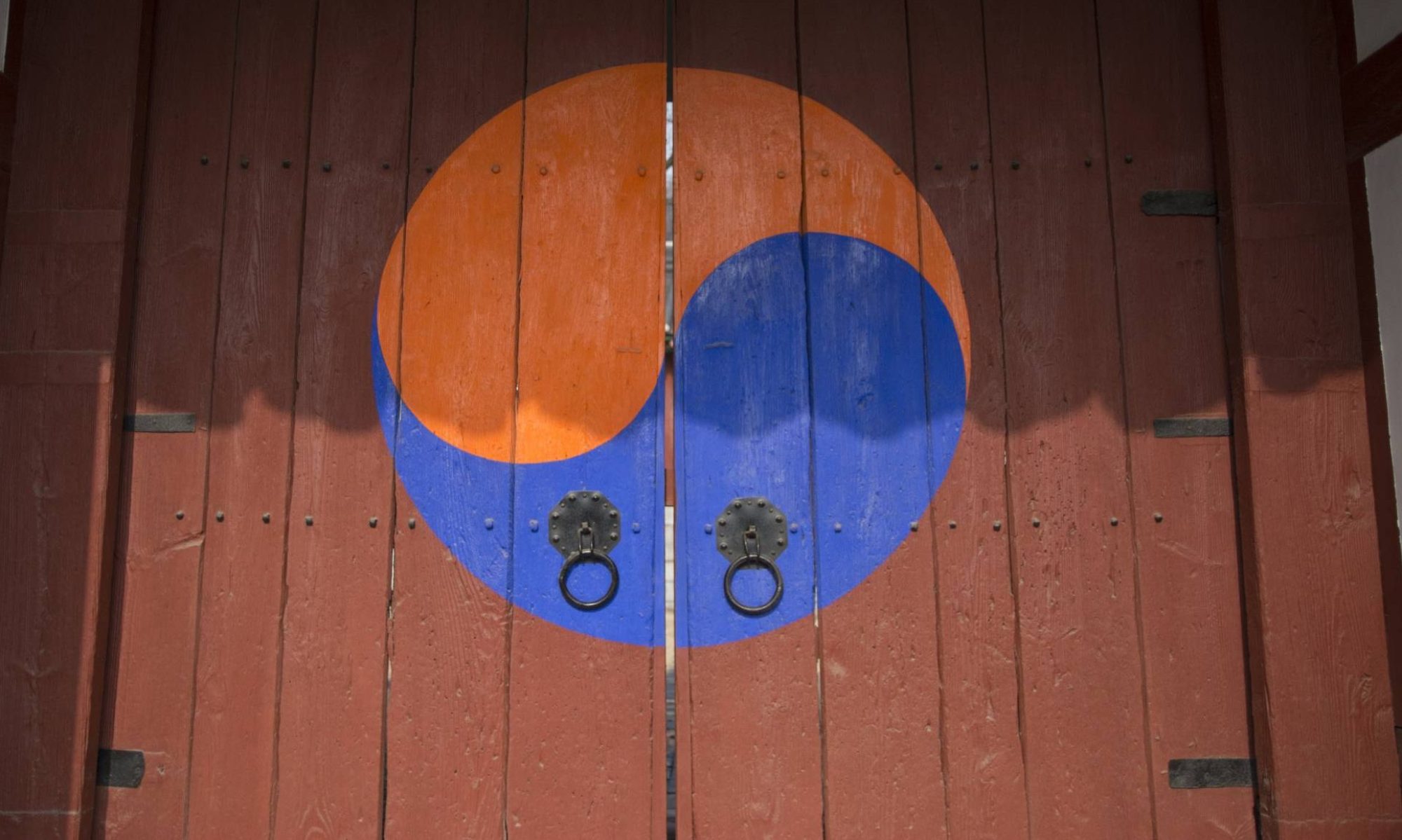Overcoming National Crisis Medal 국난극복기장령

A military coup in 1961 catapulted Major General Park Chung-hee into the highest levels of political power in Korea. Nobody denies that his impact on Korean history was substantial, and many Koreans regard him as being the right man at the right time. But as the years passed, his administration became increasingly autocratic. He was assassinated on Oct. 26, 1979 by the Korean CIA Director, Kim Jae-gyu. Koreans hoped that Park Chung-hee’s death would lead to a greater liberalization of democratic freedoms, but those hopes were quashed when Major General Chun Doo-hwan initiated a military coup on Dec. 12, 1979 (known as the 12-12 Incident). The following May, students began anti-government protest marches. On May 17, 1980, Major General Chun had opposition leader Kim Dae-jung arrested and declared martial law. Over the course of the next 10 days, the student demonstrators in the city of Kwangju were joined by an estimated 300,000 citizens. Armed conflicts erupted as the military began the indiscriminate shooting of civilians, killing, among others, a pregnant woman who stepped outside the front door of her home and an 11-year-old boy sporting a new pair of shoes given to him on his birthday. While people were dying in the streets, the government forced the press to report the uprising as a minor protest. No one is completely sure of how many people died. The official death toll was initially placed at: 144 civilians, 22 soldiers and 4 policemen, but those figures were later revised to just under 300. Many Koreans feel that the true number is closer to 1,000. The Kwangju Uprising gave considerable strength to the Minjung Movement, a popular democracy movement that eventually led to the liberal democratization of South Korea in the 1990s.
The years 1979 and 1980 were busy ones for Chun Doo-hwan. In addition to the coup and the uprising, he was promoted to full General, received the Order of Military Merit, Taeguk, retired from the military and became the President of the Republic of Korea (1980-88). Also in 1980, Chun’s handpicked successor and close aide, Roh Tae-woo was awarded the Order of Military Merit, Ulchi. During the Kwangju Uprising, Roh Tae-woo had been the head of the Army Headquarters Security Command. Roh retired from active duty with the rank of General and later became the President of the Republic of Korea from 1988 to 1993.
On Mar. 2, 1981, by Presidential Decree #10231, the Overcoming National Crisis Medal Decree 국난극복기장령 was created. The medal was awarded by the Ministry of Defense and was authorized for any Korean or foreign soldier who was stationed in Korea between Oct. 26, 1979 and Mar. 3, 1981, provided that they arrived in Korea before Jan. 25, 1981. Civilians attached to the military were also authorized to receive the medal. Government employees and civilians who rendered distinguished contributions to the nation between Oct. 26, 1979 and Jan. 24, 1981 were also authorized to receive the Medal. The medal was awarded to approx. 790,000 soldiers and civil servants after the Chun Doo-hwan regime lifted martial law (October 26, 1979–January 24, 1981).
In 1995, a Special Law was passed that legally recognized the Kwangju Uprising as a “Democratic Movement”. The two former presidents and 12 others were found guilty on Aug. 26, 1997 for their roles in the 1979 military coup, while 69 other military officers received guilty verdicts for their part in suppressing the Kwangju Uprising. Former President Chun Doo-hwan was sentenced to death, while Former President Roh Tae-woo was sentenced to 22 years and 6 months. The two former presidents were also convicted of corruption. Chun was fined $270 million and Roh was fined $350 million. Both ex-presidents were later pardoned by the then current president, Kim Dae-jung.
After the May 18th Democracy Campaign Law was passed, the surviving family members of the victims demanded that the government strip the awards of the military officers who were involved. The law did allow the government to revoke awards and medals given specifically for actions against the campaign but had failed to do so because the medals were given for a combination of reasons, and because it would be difficult to revoke medals given to subordinates without first doing so with the leader’s Chun Doo-hwan and Roh Tae-woo medals. Furthermore, It was unclear if it would even be possible to rescind the awards given to the former Presidents, since they have already been pardoned for their crimes. Another law, on the books, only allowed the government to strip an individual of his award(s) when it was requested by the government ministry that initially recommended the individual for the award(s).
The Ministry of Government Administration and Home Affairs asked the Ministry of Government Legislation and a fact-finding committee of the Defense Ministry to evaluate the legality of the awards given to the former presidents and 79 others for their roles in the 1979 military coup and the 1980 Kwangju civilian massacre. In actuality, the Ministry of National Defense and the Ministry of Government Administration and Home Affairs were each waiting for the other to act. In an effort to do something, 23 members of the ruling and opposition political parties submitted a proposal to amend the Awards and Decorations Law. The revision would require the Government Administration and Home Affairs Minister to submit to the cabinet for review, all cases where there has occurred a reason for canceling an award(s). The National Assembly passed the new amendment to the Decorations Law in June 2005. The revised law went into effect on Nov. 5, 2005. The Ministry of Government Administration and Home Affairs now has the exclusive right, without first consulting other government offices, to strip individuals of their state honors where the recipient either, exaggerated his achievements, threatened national security, or is later convicted of a crime that results in a prison term of more than three years. The new law also nullified all military honors that had been given to those involved in the suppression of the Kwangju Uprising. This did not kill the Overcoming National Crisis Medal because it was also awarded for Park Chung-hee’s assassination. Today, the Overcoming National Crisis Medal is the only Korean Medal that is viewed by many Koreans as a badge of disgrace.
On Dec. 21, 2005, Government Information Agency Chief, Kim Chang-ho, stated that a list of those to be stripped of their decorations would be finalized during the Cabinet Meeting scheduled in January 2006. On Mar. 21, the two former presidents and 174 others, including politicians, military officers and businessmen, had their awards rescinded.1 Kim Kuk-hyun, an official at the Ministry of Government Administration and Home Affairs, stated that they would be contacting the individuals involved and would start collecting the medals shortly. In addition, those involved would also be barred from wearing foreign decorations. Two other notables who were stripped of their awards were Yi Keun-an, a former police official who was notorious for torturing political prisoners and Kim Jae-gyu, the former head of the KCIA who had been tried and executed for assassinating President Park Chung-hee. Because Chun Doo-hwan and Roh Tae-woo had both been Presidents of Korea, they were allowed to keep their Grand Orders of Mugunghwa, but like all of the individuals who had been stripped of their awards, would likely be deprived of their right to be buried at the National Cemetery, and could lose their healthcare benefits and pensions. Between 1960 and 2006, only 10 people have had their decorations rescinded, including Chun Doo-hwan and Roh Tae-woo who, in 1999, were stripped of their military honors for their roles in the Kwangju Uprising. Their names were stricken from the South Korean Medal Rolls. It’s interesting to note that the Special Law, which recognized the Kwangju Uprising as a legitimate democratic movement, authorized government benefits for some demonstrators and for the bereaved family members. In September 2002, there were 3,211 people who had been declared “Persons of Distinguished Services in the Kwangju Democratization Movement of May 18, 1980”, and were receiving benefits from the Ministry of Patriots & Veteran Affairs.
There is one other side to this story. Many of the troops, who were involved in the shooting of civilians in Kwangju, had been assigned to the U.S. Military but were released just long enough to suppress the uprising. Many Koreans wonder about this. How deeply was the U.S. involved? Why didn’t they step in and stop the shooting of civilians? Koreans feel that the U.S. involvement must have been significant, since Presidential Decree #10231 specifically authorizes the awarding of the Overcoming National Crisis Medal to the American Military.
Nerves are still raw over the Kwanju Massacre. In 2017, Moon Jae-in, the former leader of the Democratic Party of Korea, suffered significant abuse when he said that he received a citation from General Chun Doo-hwan while serving in the military. Chungnam Provincial Governor Ahn Hee-jung and the People’s Party immediately launched an offensive to apologize to the citizens of Kwangju, saying, “Isn’t it better to throw away such commendations”? Representative Moon, later clarified his comment by explaining that when he received the citation, it was not related to the Kwangju Democratization Movement. The former representative retorted, the personal attack on him was an irresponsible political offense for someone who had faithfully performed national defense duties. It has been more than 40 years since the massacre, and the mention of Chun Doo-hwan still invokes a strong reaction among many Koreans. (In San Pedro, California, there is the Korean Bell of Friendship located in Angel’s Gate Park. Chun Doo-hwan, on January 29, 1981, visited the landmark and planted a tree dedicated to the everlasting friendship between the United States and the Republic of Korea. There is a small obelisk commemorating the event. I have seen Koreans spit on it when they see Chun Doo-hwan’s name.)
The National Crisis Medal was legislated out of existence by Presidential Decree #29091 on Aug. 14, 2018.
